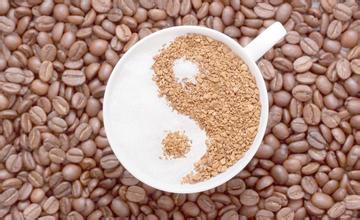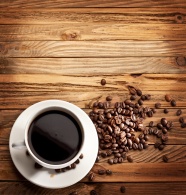Competition between Tea and Coffee in Modern England
The popularity of coffee in British society mainly lies in two favorable factors: first, the advantages of transport conditions. At that time, coffee was mainly produced in Yemen, which was closer to the United Kingdom, which was more convenient than transporting tea from China, and coffee entered the UK earlier than tea, so coffee had a head start. Second, due to the short transportation distance, the price of coffee is relatively low, while "tea is much more expensive than coffee and is still a rarity long after entering London." Therefore, from the middle to the second half of the 17th century, there was an unstoppable "coffee fever" in Europe, and Britain was no exception.
However, coffee soon encountered obstacles to its spread in the UK. As the number of cafes grows and competition intensifies, operators begin to add new drinks and provide newspapers for customers to read. It is under this background that tea has become one of the cafes, which has actually become an exchange place to provide coffee, alcohol, tea and other drinks, and the living space of coffee has been squeezed. To make matters worse, the community began to attack cafes and coffee.
In the UK, the cafe is a masculine place, often engaged in companionship and other businesses, women are excluded. Some people in the community criticize coffee in the tone of a woman. In 1674, the booklet "Women's Appeal for Coffee boycott" lamented the adverse changes caused by coffee in Britain, arguing that British men, who used to be full of masculinity, have now lost their former dignity, and that the culprit is drinking coffee. In 1675, the pamphlet "A petition from the female Brewery owner against Coffee" denounced coffee as an unlicensed commodity whose color was like ground coal, and the coffee shop undermined the sociable virtue of the British. The criticism of coffee shows that there is a boycott of coffee in British society, which is mainly based on social morality and even economic interests.
The above criticism has cast a shadow over the spread of coffee, and the political situation has also made the future of the cafe less optimistic. Since cafes are not just places to drink coffee, it has become a common phenomenon to read newspapers while drinking coffee. Illiterate people listen to others read newspapers, and people discuss social issues of concern and openly criticize the evils of the times. In order to maintain its rule, the restored Stuart dynasty ordered the closure of cafes in 1675 and 1676 with the help of social boycotts of coffee. However, due to the opposition to the ban, it could not be really implemented.
By contrast, tea has become more and more popular in middle-class British families since the 18th century. In order to be able to drink tea at any time, tea drinkers also prepare tea and tea sets at home, and tea drinking is increasingly infiltrating into family life. Queen Catherine, Mary II and Queen Anne all like to drink tea, and the continuous demonstration effect promotes the spread of tea drinking among women, and women drinking tea at home strengthens the family trend of drinking tea. Tea has a place in the cafe and has a great influence in the private space, while coffee is only related to public life, which has something to do with the characteristics of coffee: at that time, you had to roast and grind yourself when drinking coffee. "put some coffee beans at random. Put it in a baking pan or other utensils and stir over low heat to prevent it from burning. Coffee beans are white at first, turn brown when dried, and then turn black. When baked brown and about to turn black, it is ground in a mortar, ground and poured into a sealed bottle. "the complicated process is beyond the individual's processing capacity. While drinking tea is very convenient, so it can spread in both public and private space, especially in private space. With the popularity of tea drinking in the UK, afternoon tea was born. It is not only the embodiment of a warm family atmosphere, but also a field of social communication, which greatly enriches the social function of tea drinking and poses a challenge to coffee.
More decisively, the pattern of world trade has promoted the spread of tea in the UK. At first, the Netherlands was the pioneer and controller of the tea trade between China and the West. The British bought tea not only at a high price, but also in very small supply. Later, Britain actively developed in East Asia, gradually established a relatively stable trade relationship, and the terms of trade of the British East India Company were improved. The import of 41471 pounds of tea in 1690 increased to about 160000 pounds in 1712, and in 1717 "tea has replaced silk as the main commodity in trade." After the decline of the spice trade, the Netherlands gained new economic resources by introducing coffee to the East Indies. "Coffee sold reached 12 million pounds in 1723. In this way, as Europeans develop a hobby of drinking coffee, the Dutch have become the main suppliers of this foreign drink. The Netherlands has become the main supplier of coffee, while tea has become the business focus of the British East India Company and an important source of British finance. British society encourages the consumption of tea.

Important Notice :
前街咖啡 FrontStreet Coffee has moved to new addredd:
FrontStreet Coffee Address: 315,Donghua East Road,GuangZhou
Tel:020 38364473
- Prev

Coffee industry enters the upgrading period of processing equipment to meet innovation
Coffee industry to promote the development of equipment industry the active development of coffee industry will promote the development of coffee processing technology and equipment. Coffee processing generally includes peeling, fermentation, drying, baking, grinding and other steps. Among them, the most common step in life is grinding, and now coffee machines on the market have this effect. As far as the most common coffee machine is concerned, since the introduction of coffee culture to China
- Next

Chongqing strives to build the largest coffee base in China
It is understood that coffee is the second commodity in the world. In recent years, due to the economic downturn, international commodities as a whole have performed poorly, while coffee has performed very well. Coffee was the best-performing commodity in 2014, with coffee trading up 48.6 per cent. In emerging markets, China's annual coffee consumption growth rate is more than 25%, more than 10 times the world average.
Related
- Is Dirty the cold version of Australian White? What is the difference between dirty coffee/decent coffee and Australian white espresso?
- Relationship between brewing time and coffee extraction parameters How to make the brewing time fall to 2 minutes?
- Got entangled?! Lucky opens a new store, Mixue Ice City, and pursues it as a neighbor!
- How long is the shelf life of high-quality hand-brewed hanging ear coffee? Why is the taste period of hanging ear coffee ground into powder only one month?
- Why does hand-brewed espresso smell good but taste bitter? Is the flavor of high-quality hand-brewed coffee aroma or taste?
- Special treatment? COSTA's China business was evaluated separately!
- Match with Xi Tea?! Lucky will launch the new "Snow Cheese Grapes"
- What is the recommended proportion of water temperature and grinding time for hand-flushing Huakui coffee beans? What parameters should be used for cold extraction and cold brewing hand-brewed Huakui coffee?
- Share the most detailed golden formula for cold extract coffee making on the whole network! What proportion of ground is used to make cold coffee brewed for several hours?
- What are the advantages of segmented water injection for hand-brewed coffee? How many stages should I fill the water when making coffee and what is the best time for grinding the water temperature?

